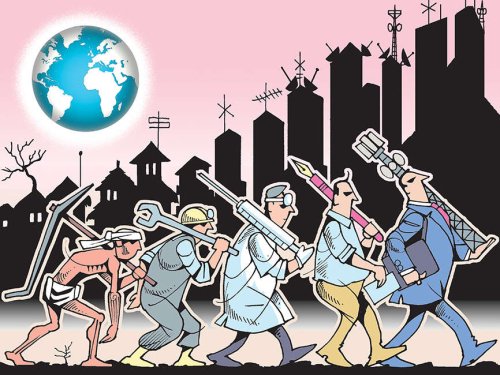Financial Express - 15 June 2020
India to step up free trade agreement talks despite self-reliance mantra
By: Banikinkar Pattanayak
“We have not abandoned the principle of free and fair trade. The government is very clear that ‘Atmanirbhar Bharat’ is neither protectionist nor isolationist.
India hasn’t shunned efforts to forge “balanced” trade agreements despite renewed push for self-reliance, and talks with key partners, including the US, the EU and Australia, will gain momentum once the impact of the pandemic wanes considerably, an official source told FE.
“We have not abandoned the principle of free and fair trade. The government is very clear that ‘Atmanirbhar Bharat’ is neither protectionist nor isolationist. It’s about getting our act together to improve domestic production of finished goods, gain from better intergration with the global value chain and ensure fair trade,” the source said. “Every country tailors its policies to suit its best interest, and we are no different,” he added.
Prime Minister Narendra Modi last month announced a Rs 21-lakh-crore relief packge, with the theme of “Atmanirbhar Bharat”.
After its pull-out from the China-dominated Regional Comprehensive Economic Partnership (RCEP) agreement in November last year, New Delhi had decided to step up talks for a slew of “balanced and fair” trade pacts, in contrast with earlier FTAs that “worsened India’s trade deficit”. It had aimed at a “limited” deal with the US, which had been in the works for several months, and a broader free trade agreement (FTA) after the presidential elections there in November.
Similarly, India wanted to clinch a trade deal with Australia—an RCEP member—this year and revive stalled talks with the EU. It had also planned to launch or fast-track bilateral talks for FTAs with the UK, South Africa and Mexico. With Brexit formally over, talks with the UK were to be launched early.
Also, New Delhi wanted to speed up talks with European Free Trade Association members – Switzerland, Norway, Iceland and Leichtenstein – for a separate trade pact in parallel to its discussions with the EU.
It was also seeking to rework its existing FTAs with Asean, Japan, Malaysia and South Korea to trim its trade deficit with these nations.
However, as the outbreak of Covid-19 forced governments worldwide to shift their focus to tackling the unprecedented health and economic crisis at hand, New Delhi, too, deployed much of its apparatus for this purpose. Also, given that the pandemic can potentially alter the course of world trade (as anti-China sentiments surge), it makes sense for India to wait and capture post-Covid realities in negotiations, analysts say.
Earlier this year, on the sidelines of the World Economic Forum summit in Davos, commerce and industry minister Piyush Goyal had held bilateral meetings with EU trade commissioner Phil Hogan, Mexico’s secretary of economy Graciela Márquez Colín, South African trade minister Ebrahim Patel and Japan’s state minister of economy, trade and industry Makihara Hideki to boost prospects of bilateral trade.
India’s tactical shift from multilateralism to bilateral engagements had come at a crucial time. Even before Covid-19 caused a havoc, world trade was witnessing heightened uncertainties. A trade war between the US and China, and a collapse of the WTO’s dispute appellate system had only multiplied challenges for India that had been a staunch advocate of the multilateral trading system.
The WTO has now forecast a 13-32% contraction in global trade for 2020, and economic growth is expected to hit the nadir since the Great Depression in 1930s. These will weigh on India, with analysts predicting an up to 6.8% contraction in its GDP in FY21, before a smart recovery next year, partly due to a favourable base.
While retreating from the 16-nation RCEP, New Delhi had said the pact, in its existing form, was unbalanced and was “really not fulfilling the guiding principles on which it started”.
Importantly, the Economic Survey for 2019-20 has pointed out that generally FTAs have been beneficial for India. Between 1993 and 2018, India’s exports of manufactured products grew at an annual average of 13.4% to partners with which it has trade agreements and such imports grew 12.7%, it says. In comparison, its overall goods exports grew at an average of 10.9% and imports 8.6% during this period.
However, amid growing protectionism across the globe, India, too, has raised imposed duties on a host of products, including shoes, toys, wooden furniture, kitchenware, appliances and certain food items, this year, which will only increase its average import duty from the already-elevated level of 17.1%. Although some other countries, including China, Japan and South Korea, boast of lower tariffs than India, they have erected massive non-tariff barriers to discourage imports that they deem non-essential.
